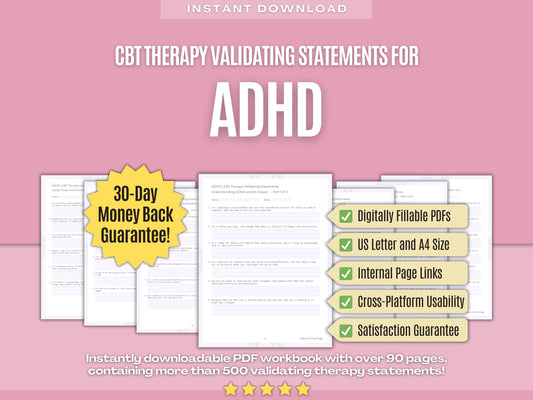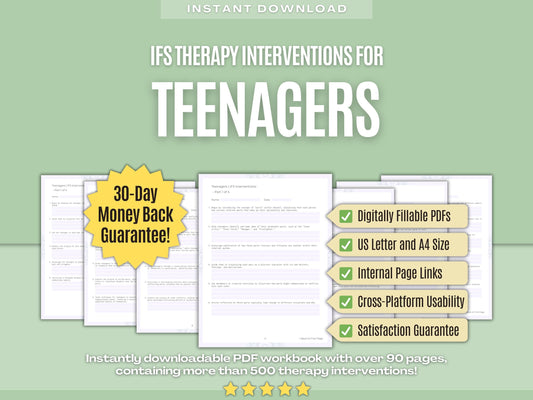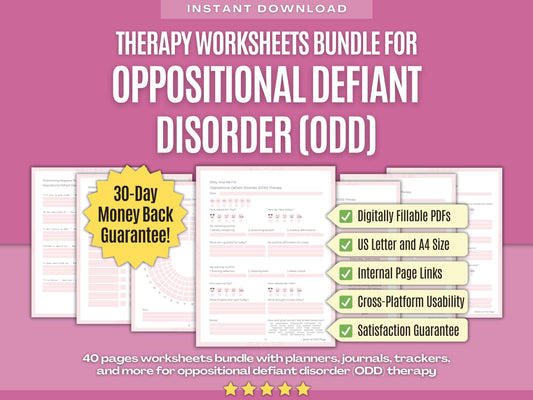Elevate Your Therapy and Guide Your Clients to Inner Healing with Our Attention Deficit Disorder (ADD) Therapy Progress Notes! ✨
1. Starting ADD Therapy
- The client attended their first session today, expressing eagerness to address challenges associated with Attention Deficit Disorder (ADD).
- The client shared their personal history, including past diagnoses, treatments, and any significant life events related to ADD.
- Together, we identified specific areas of difficulty, such as time management, organization, and impulse control, that the client wishes to address in therapy.
- We discussed the client's expectations for therapy, clarifying goals and discussing potential strategies for achieving them.
- We discussed the importance of psychoeducation in understanding ADD, including its neurobiological basis and common symptoms.
- We explored the client's strengths and resilience, identifying areas of competency that can be leveraged in addressing ADD-related challenges.
- We discussed the role of medication in managing ADD symptoms, addressing any questions or concerns the client may have had.
- We collaboratively developed an initial treatment plan, outlining specific goals, interventions, and strategies tailored to the client's needs and preferences.
- We discussed strategies for enhancing motivation and maintaining engagement in therapy, including setting achievable goals and celebrating successes.
- We explored potential barriers to treatment adherence, such as forgetfulness or procrastination, and discussed strategies for overcoming these obstacles.
- We discussed confidentiality and the limits of privacy within the therapeutic relationship, ensuring the client felt comfortable sharing sensitive information.
2. ADD Psychoeducation
- Today's session focused on providing psychoeducation to the client about Attention Deficit Disorder (ADD), aiming to enhance their understanding of the condition.
- The client learned about the prevalence of ADD and how it can manifest differently across the lifespan, from childhood through adulthood.
- The client gained insight into the diagnostic criteria for ADD as outlined in the Diagnostic and Statistical Manual of Mental Disorders (DSM-5), including the importance of assessing symptoms across multiple domains.
- The client learned about the heterogeneity of ADD presentations, recognizing that individuals may experience symptoms differently and that co-occurring conditions are common.
- The client received information about evidence-based treatments for ADD, including medication, therapy, and lifestyle modifications.
- The client learned about the importance of comprehensive treatment approaches, including behavioral interventions, psychoeducation, and support from family and professionals.
- The client gained insight into the relationship between ADD and emotional regulation, recognizing how difficulties in managing emotions can exacerbate symptoms.
- The client received information about the role of genetics and environmental factors in the development and expression of ADD.
- The client learned about the importance of self-awareness in managing ADD, including recognizing triggers, identifying strengths, and advocating for individualized support.
- The client gained insight into the lifelong nature of ADD, understanding that while symptoms may change over time, effective management strategies can promote success and well-being.
- The client received resources and recommendations for further reading, online support groups, and advocacy organizations focused on ADD.
3. Mindfulness for ADD
- Today's session focused on introducing mindfulness techniques as a therapeutic tool for managing Attention Deficit Disorder (ADD) symptoms.
- The client learned about the benefits of mindfulness for individuals with ADD, including improved attentional control, emotional regulation, and stress reduction.
- The client practiced mindfulness exercises, starting with simple techniques such as focused breathing or body scan meditation to anchor attention in the present moment.
- The client learned about the "observe, describe, and participate" framework for mindfulness, which encourages noticing sensations, labeling experiences, and fully engaging in the present moment.
- The client practiced mindfulness techniques to manage ADD-related challenges, such as reducing distractibility, enhancing concentration, and managing impulsivity.
- The client learned about the connection between mindfulness and emotional regulation, recognizing how mindfulness can help break habitual patterns of reacting impulsively to emotions.
- The client received psychoeducation about the stress response system and how mindfulness can help regulate the body's physiological arousal to promote relaxation and well-being.
- The client explored different mindfulness techniques to find those that resonate most with their preferences and lifestyle, such as mindful walking, eating, or listening.
- The client learned about the relationship between mindfulness and attentional flexibility, recognizing how mindfulness practice can enhance the ability to shift focus and sustain attention.
- The client practiced mindfulness in session, gradually increasing the duration and complexity of mindfulness exercises as they became more comfortable with the practice.
- The client received resources and recommendations for further exploration of mindfulness, including books, apps, and guided meditation recordings.
4. Dialectical Behavior Therapy (DBT) for ADD
- Today's session focused on introducing Dialectical Behavior Therapy (DBT) as a treatment approach for managing Attention Deficit Disorder (ADD) symptoms.
- The client learned about the four primary modules of DBT: mindfulness, distress tolerance, emotion regulation, and interpersonal effectiveness.
- The client practiced mindfulness exercises, such as focused breathing or body scan meditation, to anchor attention and reduce reactivity to ADD-related challenges.
- The client learned about the TIP skills (Temperature, Intense exercise, Paced breathing, Paired muscle relaxation), which can be used to modulate physiological arousal and reduce emotional dysregulation.
- The client practiced emotion regulation strategies, such as opposite action or problem-solving, to manage ADD-related emotions such as frustration, overwhelm, or impulsivity.
- The client learned about the role of interpersonal effectiveness in managing relationships and navigating social interactions effectively.
- The client practiced interpersonal effectiveness skills, such as DEAR MAN (Describe, Express, Assert, Reinforce, Stay Mindful, Appear confident, Negotiate), to communicate effectively and achieve desired outcomes in interpersonal interactions.
- The client received psychoeducation about the biosocial theory of emotion dysregulation in DBT, recognizing the interaction between biological vulnerability and environmental factors in shaping emotional responses.
- The client practiced dialectical thinking skills, learning to find synthesis and balance between opposing viewpoints or experiences related to their ADD symptoms.
- The client received resources and recommendations for further exploration of DBT skills, including books, worksheets, and online resources.
- The client expressed enthusiasm for integrating DBT skills into their treatment plan, indicating a willingness to practice skills learned in therapy to promote symptom management and overall well-being.
5. Interpersonal Therapy (IPT) for ADD Challenges
- Today, the client and I explored how their ADD symptoms are impacting their relationships, focusing on recent interactions with family members.
- We identified specific triggers in social settings that exacerbate the client's ADD symptoms and brainstormed coping strategies to manage these situations effectively.
- We discussed the client's struggles with impulsivity in interpersonal interactions and worked on implementing mindfulness techniques to pause and reflect before responding.
- We explored the client's patterns of procrastination and how it affects their ability to follow through on commitments in personal and professional relationships.
- We discussed the importance of setting boundaries in relationships to protect time for self-care and manage overwhelm associated with ADD challenges.
- We explored the impact of ADD symptoms on the client's romantic relationships, focusing on communication, intimacy, and shared responsibilities.
- We discussed the client's experiences of shame or embarrassment related to ADD symptoms and worked on reframing negative self-perceptions.
- We discussed the role of medication and other treatment modalities in managing ADD symptoms within the context of interpersonal relationships.
- We explored the client's experiences of rejection sensitivity and developed coping strategies to navigate perceived criticism or disapproval from others.
- We discussed the client's goals for improving relationships and outlined actionable steps to work towards these objectives.
- We explored the connection between self-esteem and interpersonal dynamics, working on strategies to enhance self-confidence and self-worth.
6. Emotion-Focused Therapy (EFT) for ADD
- Today, the client and I began our work using Emotion-Focused Therapy (EFT) to explore the emotional experiences underlying their Attention Deficit Disorder (ADD) symptoms.
- We identified core emotions such as anxiety, shame, and frustration that the client experiences in relation to their ADD challenges, validating and normalizing these feelings.
- We worked on building emotional awareness and regulation skills to help the client navigate intense emotions associated with ADD symptoms more effectively.
- We discussed the role of self-compassion in managing ADD-related emotions, encouraging the client to cultivate kindness and understanding towards themselves.
- We explored the connection between unmet emotional needs and maladaptive coping strategies such as procrastination or avoidance in response to ADD symptoms.
- We discussed the impact of relational dynamics on the client's emotional experiences, exploring patterns of interaction with family, friends, and colleagues.
- We explored the client's core beliefs about themselves and their ADD diagnosis, uncovering underlying emotions of self-doubt and insecurity.
- We discussed the importance of creating a supportive environment where the client feels safe to explore and express their emotions without fear of judgment.
- We explored the connection between emotional triggers and impulsive behaviors in response to ADD symptoms, identifying healthier coping strategies.
- We discussed the impact of shame and self-criticism on the client's emotional well-being, working on strategies to cultivate self-acceptance and self-compassion.
- We explored the emotional significance of the client's goals and aspirations, connecting them to a sense of purpose and meaning in their journey with ADD.
7. Psychodynamic Insights for ADD
- Today, the client and I delved into psychodynamic insights to explore the underlying emotional, cognitive, and relational factors contributing to their experience of Attention Deficit Disorder (ADD).
- We discussed the concept of unconscious conflicts, exploring how unresolved emotional tensions or desires may manifest as distractibility, disorganization, or difficulty in sustaining focus in the context of ADD.
- We explored the role of defense mechanisms such as repression, denial, and projection in the client's experience of ADD symptoms, working to bring unconscious processes into conscious awareness.
- We discussed the concept of developmental delays or disruptions, exploring how early disruptions in psychological development may contribute to deficits in executive functioning and emotional regulation characteristic of ADD.
- We explored the role of the superego in shaping the client's internal standards and self-critical tendencies, examining how perfectionism or feelings of inadequacy may exacerbate ADD symptoms.
- We discussed the concept of regression, exploring how the client may revert to earlier stages of development under stress, leading to difficulties in attention, impulse control, and emotional regulation.
- We explored the client's experiences of loss, separation, or trauma, recognizing how unresolved grief or traumatic experiences may manifest as symptoms of ADD.
- We discussed the concept of self-object differentiation, exploring how the client's sense of self and identity may be influenced by internalized experiences of validation or invalidation in relation to ADD.
- We explored the client's experiences of envy or rivalry, examining how comparison to others may exacerbate feelings of inadequacy or insecurity in managing ADD.
- We discussed the concept of repetition compulsion, exploring how the client may unconsciously recreate past experiences or patterns in their current relationships and behaviors related to ADD.
- We explored the client's internalized beliefs and expectations about themselves and their ADD diagnosis, working to challenge and reframe negative self-perceptions that may contribute to symptom severity.
8. Music Therapy for ADD Focus
- Today, the client and I began a session focused on utilizing music therapy techniques to enhance focus and attention in the context of Attention Deficit Disorder (ADD).
- We explored the use of music as a tool for regulating arousal levels, using calming melodies or upbeat rhythms to promote relaxation or alertness as needed during the session.
- We discussed the therapeutic benefits of music in modulating mood and emotional states, recognizing its potential to promote emotional regulation and resilience in managing ADD symptoms.
- We explored the client's musical preferences and associations, identifying songs or genres that evoke feelings of focus, motivation, and productivity in managing ADD challenges.
- We discussed the concept of entrainment, exploring how aligning with the rhythmic patterns of music can synchronize brainwaves and enhance cognitive functioning in individuals with ADD.
- We explored the client's experiences of flow and absorption while listening to music, recognizing these moments of deep concentration as opportunities for enhancing focus and attention.
- We discussed the role of music in facilitating social connection and communication, encouraging the client to participate in group music-making activities to foster a sense of belonging and community support.
- We explored the client's experiences of using music as a mnemonic device to aid in memory retention and recall, recognizing its potential to enhance learning and academic performance in individuals with ADD.
- We discussed the therapeutic potential of songwriting or lyric analysis as a means of processing and expressing emotions related to living with ADD, providing a creative outlet for self-expression and exploration.
- We explored the client's experiences of using music as a coping strategy during moments of stress or overwhelm, recognizing its ability to provide comfort and distraction from ADD symptoms.
- We discussed the client's progress and insights gained through music therapy, recognizing the transformative potential of musical interventions in enhancing focus, attention, and overall well-being.
9. Wrapping Up ADD Therapy Sessions
- As today's session comes to a close, the client and I took time to reflect on the progress they have made throughout their journey in ADD therapy.
- The client shared insights gained, skills learned, and coping strategies developed throughout the course of therapy to manage their ADD symptoms effectively.
- The client reflected on their personal growth and self-awareness, recognizing how therapy has empowered them to better understand themselves and their ADD.
- The client expressed gratitude for the support, guidance, and validation received from the therapist throughout the therapeutic process.
- The client identified areas of continued focus and growth beyond therapy, recognizing the importance of ongoing self-care and support in managing ADD.
- The client reflected on the changes they have noticed in themselves since starting therapy and expressed optimism about their future with the tools acquired.
- The client discussed their feelings about concluding therapy and any emotions that may arise during the transition process.
- The client reflected on the impact of therapy on their relationships, work, and overall quality of life, recognizing the positive changes that have occurred.
- The client expressed confidence in their ability to navigate future challenges and setbacks with the skills and insights gained from therapy.
- The client reflected on the support systems and resources available to them outside of therapy, recognizing the importance of seeking help when needed.
- The client expressed appreciation for the opportunity to engage in therapy and reflected on the positive impact it has had on their life.
10. Conclusion of ADD Therapy
- Today marks the conclusion of the client's journey in ADD therapy, and we took time to reflect on the significant progress they have made throughout their therapeutic process.
- The client shared insights gained, skills learned, and coping strategies developed during their time in therapy to effectively manage their ADD symptoms and improve their overall well-being.
- The client reflected on their personal growth and self-awareness, recognizing how therapy has empowered them to better understand themselves and their ADD.
- The client expressed gratitude for the support, guidance, and validation received from the therapist throughout the therapeutic process.
- The client identified areas of continued focus and growth beyond therapy, recognizing the importance of ongoing self-care and support in managing ADD.
- The client reflected on the changes they have noticed in themselves since starting therapy and expressed optimism about their future with the tools acquired.
- The client discussed their feelings about concluding therapy and any emotions that may arise during the transition process.
- The client reflected on the impact of therapy on their relationships, work, and overall quality of life, recognizing the positive changes that have occurred.
- The client expressed confidence in their ability to navigate future challenges and setbacks with the skills and insights gained from therapy.
- The client reflected on the support systems and resources available to them outside of therapy, recognizing the importance of seeking help when needed.
- The client expressed appreciation for the opportunity to engage in therapy and reflected on the positive impact it has had on their life.
We hope that our therapy progress notes for Attention Deficit Disorder (ADD) therapy will help you to elevate your therapy practice and guide your clients to inner healing! Do you need more therapy progress notes for Attention Deficit Disorder (ADD) therapy? Find them all in our Digital Workbook! Or do you have any questions or suggestions for us? Please feel free to contact us at any time!


















